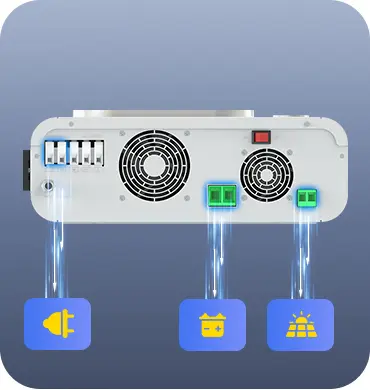With the popularity of mobile devices, Portable Power Stations have become an indispensable part of people’s lives. As the core component of Portable Power Stations, the battery management system plays a vital role in its performance and safety. This article will delve into the battery management system in Portable Power Stations, including its functions, working principles, and key technologies.
-
Functions of battery management system
The battery management system is the “brain” of Portable Power Stations and is mainly responsible for the following functions:
Battery monitoring: Real-time monitoring of battery status, including voltage, current, temperature and other parameters, to ensure the normal operation and safety of the battery.
Charging management: According to the status of the battery and user needs, intelligently control the charging process, including charging current, voltage and charging time, to extend battery life.
Power estimation: Accurately estimate the remaining power of the battery, provide users with accurate power information, and avoid affecting use due to insufficient power.
Fault diagnosis: timely detect and diagnose battery faults, such as overcharge, over-discharge, short circuit, etc., and take corresponding protective measures.
Communication function: Communicate with other devices, such as interacting with mobile devices, providing charging status and power information, etc.
-
Working principle of battery management system
Battery management systems usually consist of sensors, controllers and actuators. The sensor is used to collect various parameters of the battery, and the controller analyzes and processes these parameters, and then issues control instructions to the actuator according to the preset algorithm and strategy, thereby realizing the management and control of the battery.
During the charging process, the battery management system will adjust the charging current and voltage based on the current status of the battery and the charging target set by the user to achieve the best charging effect. At the same time, the system will monitor the battery temperature in real time to avoid damage to the battery caused by overheating. During the discharge process, the system will intelligently allocate power according to the remaining battery power and load requirements to extend the battery life.

-
Key technologies of battery management system
Accurate power estimation: Accurately estimating the remaining power of the battery is one of the important tasks of the battery management system. Commonly used power estimation methods include open circuit voltage method, internal resistance method, ampere-hour integration method, etc., and are modified and optimized based on battery characteristics and historical usage data to improve the accuracy of power estimation.
Efficient charging algorithm: In order to improve charging efficiency and extend battery life, the battery management system needs to adopt an efficient charging algorithm. For example, technologies such as intelligent segmented charging and pulse charging can effectively reduce charging time and heat generation, while improving battery capacity and performance.
Battery balancing technology: Since the performance of individual battery cells in the battery pack may be different, the overall performance of the battery pack is reduced. Battery balancing technology balances charging or discharging of battery cells to make the status of each battery cell consistent, thereby improving the life and performance of the battery pack.
Temperature Management: Temperature has a huge impact on battery performance and lifespan. The battery management system needs to monitor the battery temperature in real time and take effective cooling measures, such as fans, heat sinks, etc., to ensure that the battery operates within a suitable temperature range.
Safety protection mechanism: In order to ensure the safe use of batteries, the battery management system needs to have a variety of safety protection mechanisms, such as overcharge protection, over-discharge protection, short-circuit protection, etc., to prevent battery damage or safety accidents.
-
Summary
The battery management system in Portable Power Stations is key to ensuring their safe and efficient operation. Through real-time monitoring, intelligent control and efficient management, the battery management system can extend battery life, improve charging efficiency, and provide users with a better user experience. With the continuous development of technology, the battery management system will continue to be improved and optimized to provide more reliable support for the wide range of applications of Portable Power Stations. In the future, we can expect more intelligent, efficient and secure Portable Power Stations to bring greater convenience to our lives.



